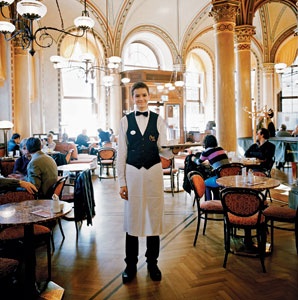 In a city steeped with tradition, Vienna struggles to save its historic coffee houses.
In a city steeped with tradition, Vienna struggles to save its historic coffee houses.
The Viennese speak of a coffeehouse as having a soul, often resisting even the slightest change to the 300-year-old institution. “In Vienna, the Kaffeehaus is a cultural enclave untouched by time,” says local landscape architect Roman Ivancsics as he plows through a stack of newspapers at Old Town’s Café Korb, on the corner of Tuchlauben Strasse and Brandstätte, whose opening in 1904 was so noteworthy that Emperor Franz Josef attended.
Puffing cigarettes between sips of espresso, or kleine Mokka as the Viennese call it, Ivancsics sits amid marble-topped tables and bentwood chairs strewn with regional German-language dailies and foreign titles such as Le Monde and Corriere della Sera. Waiters, formally clad in jackets and bow ties, rush about with steaming coffee cups and plates of pastries, providing excellent service, not with a smile, but rather with serious attitude marked by a butler-like blend of gravitas, unctuousness, and charm.
“A democratic club,” was how the Austrian writer Stefan Zweig described the Viennese coffeehouse in his 1943 memoir The World of Yesterday, claiming it to be “the best place to keep up with everything new.” Zweig was but one of countless intellectual and artistic luminaries, including Sigmund Freud, Gustav Klimt, and Leon Trotsky, whose constant presence in the Viennese café scene throughout the early 20th century gave it legendary status.
Nearly 70 years after Zweig’s book appeared, these fabled meeting places face an uncertain future as newspaper readers switch to the Internet, café operators grapple with higher real estate costs due to generational shifts in management, and older establishments face competition from more modern chains, including Starbucks (there are now nine in Vienna) and the Indian-owned Coffee Day.
In 1900 the city had at least 600 coffeehouses; today only several hundred remain. Three popular venues—Café Servus, Café Schopenhauer, and Café Wilder Mann—have shut down within the past year and a half. Café Ritter, which opened in 1867, declared bankruptcy in 2009 and an H&M clothing store was set to occupy its quarters, in a former aristocratic palace, until a “Save Café Ritter” page on Facebook attracted 4,600 fans. (For now, a new owner has rescued it from extinction.) Café Museum, designed in 1899 by pioneering architect Adolf Loos, was also closed for nearly a year until new management reopened the old haunt of Egon Schiele and Oskar Kokoschka as a tradition-minded coffeehouse last October.
Vienna’s city councillor for cultural affairs, Andreas Mailath-Pokorny, concedes that the coffeehouse “needs to change with the times,” but he downplays the prospect of its disappearing altogether. As much as opera and the waltz, it has been, after all, part and parcel of Vienna’s self-image ever since the Turks introduced the caffeinated beverage during their siege of the city in 1683. As the story goes, the army left behind sacks of beans after being defeated by the Austrians.
In recent years, many café owners have added wireless Internet to accommodate laptop-toting patrons. Whether such tinkering is enough to change the downhill trend remains unclear. Indeed, Berndt Querfeld, the head of the coffeehouse department at Vienna’s Chamber of Commerce, speaks of a “death spiral” whereby many older coffeehouses have neither renovated nor invested in infrastructure. “Some have not repainted for thirty years,” he says. “The cakes are stale and at a certain point the customer can’t take it.”
Querfeld, who runs the fashionable Café Landtmann and five other spots, has taken pains to ensure his own establishments survive. Four years ago, he added a glass-enclosed winter garden at Landtmann, designed by the cutting-edge Austrian firm Wehdorn Architects, that poses a striking contrast to the wood-paneled Jugendstil interior lit by ornate brass chandeliers. The soaring rooms are now nearly always filled with Vienna’s leading political and media figures, who are drawn to the café’s excellent food (Wiener schnitzel; Würstel) and location near Parliament.
Meanwhile, the Viennese coffee firm Julius Meinl, founded in 1862 and billing itself as the world’s oldest coffee brand, seeks to reinvigorate café culture by ensuring the quality of its beans and staff. “In Vienna, we have a very discerning clientele,” the fifth-generation owner Thomas Meinl tells me during a visit to one of the company’s training centers on the outskirts of the city. Meinl recently introduced new brewing and grinding equipment and his offerings now include flavored coffees, virtually unheard of in the city before.
In another bid to stave off closures, Gregor Eichinger, a prominent Viennese architect, is calling on the city to grant tax breaks and for owners to rethink the very institution. To that end, he recently organized an exhibition at the Museum of Applied Arts entitled “The Shape of the Café to Come,” and invited five design teams to create new tables, seating, and dishes for the coffeehouse of the future.
The exhibition prompted a heated discussion in the Viennese media—an article in Der Standard elicited hundreds of comments, many passionately in defense of the status quo. Still, owners feel pressure to modernize. While neo-nomenclature like “soy chocochino” might have been anathema a decade ago, owners like Querfeld are trying out such things. “We’re innovating slowly,” he says, expressing certainty that the institution is nowhere near its end. “The traditional Viennese coffeehouse,” Querfeld wagers, “has survived two world wars and many economic crises. It will stay around.”
Café Bräunerhof 2 Stallburggasse; 43-1/512-3893
Café Central 17 Herrengasse; 43-1/533-3764
Café Korb 9 Brandstätte; 43-1/533-7215
Café Landtmann 4 Dr. Karl Lueger-Ring; 43-1/2410-0100
Café Museum 7 Operngasse, Karlsplatz; 43-1/2410-0620
Café Prückel 24 Stubenring; 43-1/512-6115
Café Ritter 73 Mariahilferstrasse; 43-1/587-8238
Café Weimar 68 Währingerstrasse; 43-1/317-1206